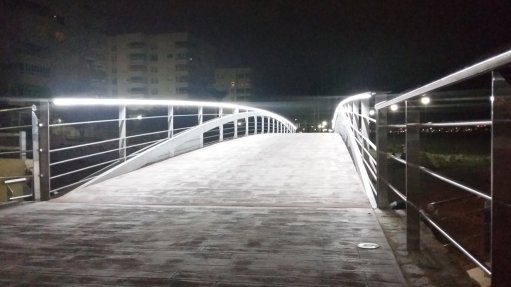
ÁGUILAS BRIDGE The lightweight stainless steel footbridge was erected over the Cañarete watercourse, at the popular coastal town in the south of Spain
Multinational stainless steel manufacturer Outokumpu has seen more of its products being used in construction projects in recent years, owing to changes in technology, increased environmental awareness and economic constraints.
Increasingly sophisticated medical equipment requires an equally sophisticated approach to construction of medical facilities. An example is the six-storey expansion at Danderyd Hospital, in Stockholm, Sweden, which now features stainless steel beams provided by multinational stainless steel manufacturer Outokumpu – which is critically important for patients undergoing diagnostic testing.
In this instance, stainless steel beams are being used to strengthen an extension of the hospital. Outokumpu architecture, building and construction segment business manager Anders Finnås says that, compared with ordinary carbon steel, stainless steel generates significantly fewer magnetic disturbances. This means that, owing to its low magnetism, stainless steel is better suited to applications in hospitals and clinics where magnetic resonance imaging equipment is used.
Finnås comments that the tailor-made plates were produced at Outokumpu’s Quarto Plate Europe (QPE) mill, in Degerfors, Sweden. He notes that, as it specialises in quarto plate in high-performance stainless grades, Degerfors is uniquely equipped to produce beams such as those used in the Danderyd project.
From the QPE mill, the plates went to Outokumpu PSC Nordic, also in Degerfors, for final processing. “The close cooperation between QPE and PSC Nordic enabled us to secure this order,” Finnås says, adding that the company offered a final, tailor-made product to its customer, instead of just plates.
He explains that the seven 9 t beams, measuring 1 m × 9 m, were tailored to precise requirements at PSC Nordic. After final cutting, the beams were assembled and welded into finished, construction-ready sections.
Finnås adds that some of the benefits that Danderyd Hospital experienced as a result of contracting Outokumpu include measurable cost savings, easy welding and assembly processes owing to a well-made product, and quick and efficient delivery.
Recent Projects
Outokumpu also recently provided solutions for building projects in the coastal town of Águilas, in south-eastern Spain, and Barcelona, in the north.
The Águilas bridge project, which started in April last year, addressed the problem of pedestrians on the seaside promenade: they could not walk directly from the centre of town to the marina, as it was separated by a ravine. Therefore, a stainless steel footbridge was erected to connect these two neighbourhoods, crossing 35 m above the Cañarete watercourse. The bridge was completed late last year.
Spanish State-owned enterprise (SoE) Acuamed focused on two key design requirements for this project, namely that the structure had to be durable and lightweight.
“[The bridge] is constantly exposed to the sea breeze, which is very corrosive and can quickly cause microperforations and rust,” explains Acuamed engineering and construction director Fernando Villalba. “This could result in structural problems and high maintenance costs.”
Villalba notes that the SoE required a footbridge with limited visual impact on the surroundings. Additionally, the watercourse below could carry large amounts of rainwater, so the bridge had to span the entire width of the ravine without any middle support.
At first, carbon steel and wood were considered as possible materials, but Acuamed chose duplex stainless steel because of its superior resistance to corrosion, low maintenance costs and aesthetic features. “Duplex is a material that can withstand outdoors exposure for many years,” Villalba remarks.
Engineers tested different types of duplex grades until they settled on the Forta DX 2205. “The technical department of Outokumpu recommended Forta DX 2205, based on its previous experience. [Acuamed is] happy with the choice of this material,” Villalba recounts.
Forta DX 2205 also satisfied Acuamed’s need for a light structure. “A different type of steel would have needed thicker, larger beams, which would have made the structure heavier and more cluttered,” says Villalba.
He explains that Outokumpu delivered the custom-cut sheets straight from the factory to a local workshop. The footbridge was fully assembled offsite and then transported by road to its final location.
Meanwhile, Outokumpu has, since 2013, been supplying stainless steel – specifically stainless steel rebar, bar, machined components and plasma-cut plate products – to the project managers responsible for the completion of the La Sagrada Família basilica.
La Sagrada Família is a United Nations Education, Scientific and Cultural Organisation, or Unesco, World Heritage Site, which was commissioned in 1882, and designed in 1866 by architect Antoni Gaudí. It is expected to be completed in 2026.
The reason for the ongoing construction is that Gaudí, who directed the construction process until his death in 1926, would often request that work be modified and adjusted until it correctly matched his architectural vision. Since his death, his designs and work have become subject to interpretation, with many contractors and architects differing on how to interpret his vision.
Once completed, the 18 towers of La Sagrada Família will reach heights between 94 m and 182 m. Stainless steel rebar was selected for the tower structures owing to its high strength, exceptional corrosion resistance and reduced life-cycle costs.
Outokumpu is the sole stainless steel supplier for the project, delivering products in Outokumpu Forta DX 2304 and Forta DX 2205 grades in easy-to-assemble sizes and shapes.
The basilica is a leading tourist attraction, with more than 3.2- million visitors each year.